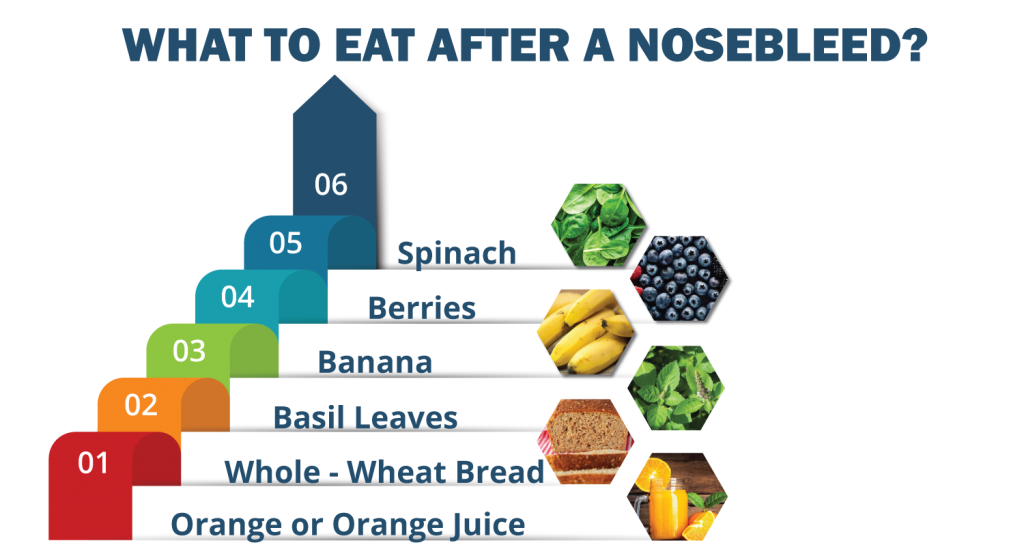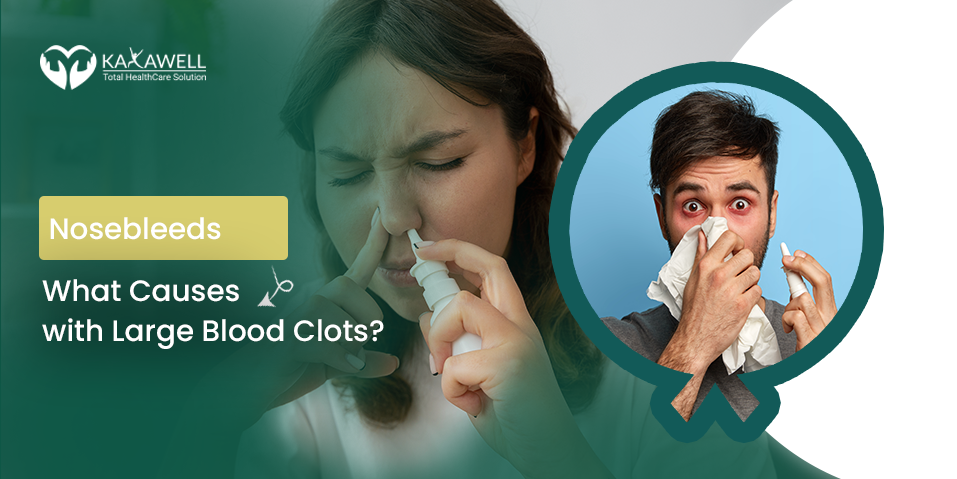Have you ever experienced a nosebleed or felt a bloodstream flowing down your nose? Research suggests that 60% of people experience nosebleeds at least once. Yes! Nasal bleeding is quite common and not a severe cause for concern. But nosebleeds with blood clots are something that you should handle with care.
What is a Nose Blood Clot?
Blood in our body has a complex task. It must flow consistently and continuously throughout your body for the entirety of your life.
The size of blood clots might vary. Consult a professional immediately if you encounter large nose blood clots after a nosebleeding.
However, it can be scary for some of the patients as it looks like something is damaged within their internal organs. So, let’s get a brief idea about nose bleeding causes and all the associated information to cure and prevent them.
Read Also: Nosebleeds- Symptoms, Causes, Risk Factors And Prevention
What is a Nosebleed (Epistaxis) with Blood Clots?
The word “epistaxis” which is the medical term for “nosebleed“. Bleeding occurs when blood vessels in the nose burst. The body responds to this injury by creating a blood clot in the nose. This stops the blood from leaking and repairs the damaged vessels. Nose blood clots are very common and rarely harmful.
Under these circumstances, the sensitive tissues lining your nose are more likely to dry up, get irritated, or even bleed. Picking or scratching your nose is another common cause. It may harm the delicate blood vessels and cause a bleed. In addition to weakening blood vessels and raising the risk of Epistaxis, persistent inflammation in the nasal passages is frequently linked to allergies or sinusitis.
Even though most nose bleeding reasons are small and go away on their own without the need for medical attention, knowing the causes and appropriate management strategies can help you deal with them collectively.
What Causes Nosebleeds(Epistaxis)?
In most cases, nosebleeds occur from dilated blood vessels on the front bottom of the nose. Epistaxis, or nosebleeds, can arise from various factors that irritate or damage the delicate blood vessels inside your nose. Here are some common causes:
Dry air can be a major problem, especially in hot, arid climates and in the winter when low interior humidity levels occur. Dry air irritates and dehydrates the delicate nasal lining, raising the possibility of blood vessel rupture.
Physical Trauma: A blow to the face or a hard knock to the nose can cause damage to the blood vessels in the nasal cavity, which can lead to bleeding.
Chronic Inflammation: Allergies, sinusitis, and other conditions that generate persistent inflammation can weaken the blood vessels in the nasal passages, increasing the risk of nosebleeds.
Medication: Blood-thinning medications that raise the risk of bleeding, including nosebleeds, include aspirin and anticoagulants.
High Blood Pressure: Excessive blood pressure puts additional strain on all blood vessels, especially the fragile blood vessels of the nose, increasing the risk of rupture.
Nasal Septum Abnormalities: Changes or abnormalities in the cartilage wall that divides the nostrils, known as the nasal septum, can irritate the nasal lining and raise the risk of haemorrhaging.
Specific Health Conditions: Nasal bleeding can be made more likely by certain underlying medical diseases, such as liver issues or hereditary hemorrhagic telangiectasia.
Can Nosebleeds with Blood Clots Indicate Other Serious Illnesses?
Yes, Nosebleeds can result from a range of other health issues. These include:
- Hypertension.
- Heart ailments (mainly in the elderly).
- Thrombocytopenia (deficient level of platelets in the blood).
- Leukemia.
- Hemophilia.
- Fractures.
- HIV.
- Von Willebrand Disease (hereditary blood clotting disorder).
- Severe liver ailments.
Most nosebleeds heal by themselves. A doctor is not required unless the bleeding persists for more than 20 minutes or happens following an injury.
What Causes Nosebleeds When You are Sleeping?
The same factors that cause nosebleeds to happen during the day also cause them to happen at night.
Cold, dry air can harm your nose’s sensitive nasal membrane, leading to bleeding. People occasionally pick their noses at some point during the night, which can harm a nearby blood artery.
It would be more urgent if someone has recently been ill, particularly with sinus infection symptoms. The bacteria causing the illness may have destroyed the nose membrane, which is why it is bleeding.
Antibiotics are usually required for minor infections. But infections, particularly those that have already entered the circulatory system, might have significant side effects, including sepsis.
Consulting with a qualified physician would be advisable for the best care and treatment. Particularly if bleeding persists and one has a history of low platelets.
Common Symptoms lead to Nosebleed.
A nosebleed can be accidental or part of any discomfort in the body. Here are some common nose bleeding symptoms.
- Headache
- Salty or Metallic Taste in Mouth
- Facial Pain or Swelling
- Nausea or Vomiting
- Fatigue or Dizziness
- Fever
- Difficulty Breathing
- Trouble Sleeping
- Visible Blood Clots
Read More: Sleep Disorders: Common Causes, Symptoms & Types
How to Stop a Nosebleed
Use these home remedies to prevent frequent nose bleed causes.
A nosebleed can be cured easily with simple processes:
1. Stay calm, and don’t panic, as this can make the situation worse. Take deep, soft breaths and sit straight on the comfortable chair.
2. Lock your nose using the thumb or index finger at the soft portion of the nose for approximately 10 to 15 minutes. Till then you can reach through your mouth.
3. Put an ice pack or any cold and smooth object on the bridge of your nose. It will help keep blood flowing and reduce bleeding.
4. Don’t put any pressure on your nose. Some people might find irritation when they are bleeding, and they would like to pick or rub their nose. As a result, it will make the situation worse.
5. Some people like to sleep straight on the bed. In this situation, the bloodstream will flow down your throat and make you gag.
6. Apply nose bleeding first aid recommended by the doctor to stop the continued flow of blood.
What to Eat After a Nosebleed?
Some foods have natural healing properties. Eating them not only aids recovery but also helps in preventing future bleeding. Drinking a lot of water can also aid in healing nosebleeds with large blood clots. Eat these immediately after a nosebleed:

- Oranges or orange juice
- Banana
- Basil leaves
- Berries
- Spinach
- Whole-wheat Bread
Read More: 12 Health Benefits Of Basil Or Tulsi
Why should a patient connect with a Doctor in a severe case of Nosebleed?
Generally, nosebleeds can stop after a certain amount of time. In some instances, it becomes worse. The only way to stop is to consult a doctor and get the necessary nose bleed treatment. However, it also depends on the reason for nose bleeding. If you had any facial injury or got in a fight, then the impact might be different, and it will lead to serious bleeding, so the only way to stop is to get medical treatment.
Overall, blood can be casual sometimes, but the patient should not ignore it if prone for a long time. Patients should connect with a doctor if they can’t find any resolution to the current status of their nosebleeds. Additionally, do not force or implement any medication without the Doctor’s recommendation.
To Sum Up
Nosebleeds with large blood clots might look frightening to the patient, but they can be easily treated. When a patient sees their nose bleeding or releasing blood clots, they might get nervous and try to stop it as soon as possible. However, they are unaware of the proper treatment and how to tackle these situations where your nose is bleeding. Most of the time, it may occur due to a Breakdown of the inner lining of the nose. Sometimes, it can be a reason for some chronic disease or illness. Therefore, get a complete idea about nose bleeding and its symptoms. Also, understand how to treat it or what the best time to connect with the doctor is to stop your nose bleeding.
FAQs
Q1 What causes nose bleeds the most frequently?
Dry air is usually the cause of nosebleeds. This is particularly true in hot and dry climates or during the winter when indoor humidity is low. Dry air irritates and dries out the sensitive nasal lining.
Q2 Is it possible to pick my nose and not get nosebleeds?
No, nosebleeds are frequently brought on by picking your nose. Picking or scratching can easily irritate and damage the delicate blood vessels in your nose. To prevent unintentional irritation it is important to keep your hands away from your nose and to cut your fingernails.
Q3 Do allergies and nosebleeds go together?
Indeed, allergens may have a role in nosebleeds. Allergies induce long-term inflammation of the nasal passages, weakening the blood vessels and increasing the risk of a rupture and bleeding.
Q4 Can nosebleeds be caused by specific medications?
Anticoagulants and aspirin, two blood-thinning drugs, can make it more likely for you to bleed internally, including from your nose. If you have any concerns about the possibility of nosebleeds while taking these medications, discuss them with your Doctor.
Q5 How does high blood pressure result in nosebleeds?
When uncontrolled hypertension exists, all of your blood arteries, especially the fragile ones in your nose, are subjected to additional strain. As a result of the increased pressure, they are more likely to burst and produce nosebleeds.

Leave a Reply
You must be logged in to post a comment.